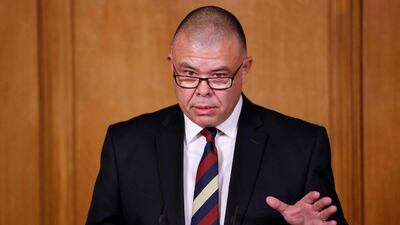People vaccinated against coronavirus are still likely to pass the disease on, one of Britain’s leading scientists said on Sunday.
England’s deputy chief medical officer, Prof Jonathan Van-Tam, said that even after having two doses “you may still give Covid to someone else”.
Prof Van-Tam warned the 5.8 million people in Britain who have been vaccinated to continue to observe strict lockdown rules as the country was likely to pass 100,000 deaths this week.
So far, 3.6 million people in the UK have been infected and 97,939 have died from the virus.
"We do not yet know the impact of the vaccine on transmission of the virus," Prof Van-Tam wrote in The Sunday Telegraph.
“So even after you have had both doses of the vaccine, you may still give Covid to someone else and the chains of transmission will then continue.
“If you change your behaviour you could still be spreading the virus, keeping the number of cases high and putting others at risk who also need their vaccine but are further down the queue.”
He said hospitals still had a large number of Covid-19 admissions, with a quarter of people receiving treatment for the virus under the age of 55.
“Despite the speed of the roll-out, these are people who will not have the vaccine for a while yet,” Prof Van-Tam said.
It is also possible to contract the virus in the two or three weeks after inoculation, he said.
“Regardless of whether someone has had their vaccination or not, it is vital that everyone follows the national restrictions and public health advice, as protection takes up to three weeks to kick in and we don’t yet know the impact of vaccines on transmission,” Prof Van-Tam said.
With immunity taking time to build up, particularly in the elderly, he stressed the need for people to stay safe.
“If you are older it’s better to allow at least three weeks. You can still get Covid in this time.”
Prof Van-Tam said that while Covid-19 vaccines offered hope, “no vaccine has ever been 100 per cent effective, so no one will have 100 per cent protection from the virus”.
“The vaccine has brought considerable hope and we are in the final furlong of the pandemic," he wrote.
"But for now, vaccinated or not, we still have to follow the guidance for a bit longer.”
He defended the British government’s decision to keep the gap between the two doses at 12 weeks, despite the British Medical Association urging it be halved.
“Who on the at-risk list should suffer slower access to their first dose so that someone else who's already had one dose can get a second?” Prof Van-Tam asked.
But a doctor called the 12-week gap between doses of vaccines an “unregulated and unlicensed trial”.
“What really concerns us is we don’t know what happens if you don't give that second dose of vaccination after three weeks,” Dr Rosie Shire said.
Studies show that two doses given three weeks apart provided 90 per cent immunity, Dr Shire said.


